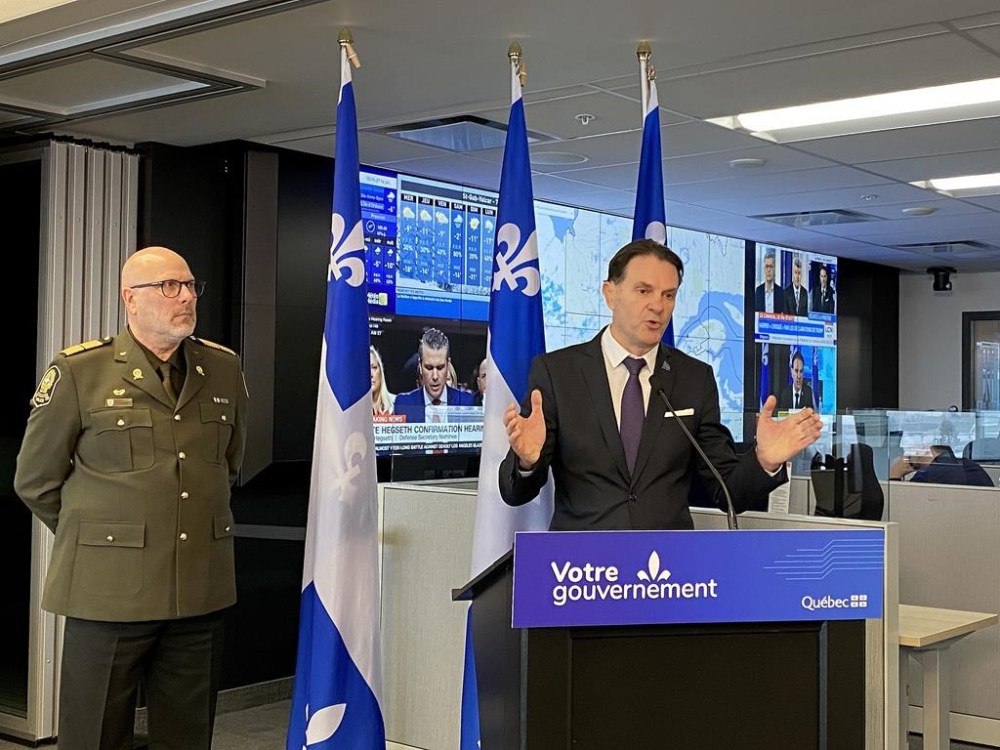In response to Trump threat, Quebec ready to deploy another 300 officers at border
Advertisement
Read this article for free:
or
Already have an account? Log in here »
We need your support!
Local journalism needs your support!
As we navigate through unprecedented times, our journalists are working harder than ever to bring you the latest local updates to keep you safe and informed.
Now, more than ever, we need your support.
Starting at $15.99 plus taxes every four weeks you can access your Brandon Sun online and full access to all content as it appears on our website.
Subscribe Nowor call circulation directly at (204) 727-0527.
Your pledge helps to ensure we provide the news that matters most to your community!
To continue reading, please subscribe:
Add Brandon Sun access to your Winnipeg Free Press subscription for only
$1 for the first 4 weeks*
*$1 will be added to your next bill. After your 4 weeks access is complete your rate will increase by $4.99 a X percent off the regular rate.
Read unlimited articles for free today:
or
Already have an account? Log in here »
Hey there, time traveller!
This article was published 14/01/2025 (247 days ago), so information in it may no longer be current.
The Canadian government must deploy more officers to the United States border to show president-elect Donald Trump that Canada is serious about stopping illegal immigration, Quebec’s public security minister said Tuesday.
With about one week to go before Trump’s inauguration, François Bonnardel told reporters that the Canadian government should focus its efforts in a region known as the Swanton sector, where more than 70 per cent of illegal crossings into the U.S. occur.
Of the 26,000 illegal crossings from Canada into the United States reported in 2024, Bonnardel said, 19,000 were in the Swanton region, a stretch of land that touches parts of Quebec, Ontario and the states of Vermont and New York. Swanton also includes Akwesasne, a Mohawk territory that straddles Quebec, Ontario and New York state.

“So we must put 80 per cent of the future efforts … in this sector to show Americans there is a decline in the coming months,” he said about the flow of migrants across the border.
For weeks, Trump has threatened to impose tariffs on Canada’s exports if the federal government doesn’t improve border security.
Bonnardel says that while the federal government recently pledged $1.3 billion to upgrade security, it’s unclear how that money will be parcelled out. The minister plans to join Quebec Premier François Legault in Ottawa on Wednesday for a meeting involving provincial and territorial leaders and the federal government over border concerns.
The largest percentage of migrants who cross illegally into the U.S. are Indian nationals, Bonnardel said. “Why the Indian community? From what I understand, these people arrive (in Canada) legally with permits and visas and try to cross to the other side.”
There are currently 800 federal and provincial officers and other officials operating in the Swanton sector. Bonnardel said Quebec is ready to deploy 300 additional provincial police officers within 48 hours if there’s a marked rise in illegal crossings into the U.S.
Meanwhile, Quebec is tripling the number of provincial police officers lent to the U.S.-led border enforcement security task force, for a total of nine officers. Their work is co-ordinated by the Homeland Security Investigations, and the officers fight organized crime at the border. Canadian law enforcement partners are also involved.
Also Tuesday, the Saskatchewan government announced it would send 16 officers to patrol high-priority areas at its border with the U.S. The officers are to be drawn from the province’s conservation, highway patrol and canine-handler teams.
Premier Scott Moe said the officers are to patrol high-priority areas and will be equipped with a mobile command unit, licence plate readers, drones, snowmobiles, all-terrain vehicles and three planes.
“If our largest trading partner has identified the 49th parallel and border security as a challenge, then that’s a conversation we need to partake in,” Moe said.
So far this year, there’s nothing right nowto suggest there will be a significant rise in the flow of migrants in either direction of the border, Bonnardel said.
“But I can’t sit back,” he added, suggesting that Trump’s rhetoric on quickly deporting illegal immigrants as soon as he takes office might trigger an influx of people into Canada. “We have to prepare to face a possible flow (of migrants) in the coming days, the coming weeks.”
This report by The Canadian Press was first published Jan. 14, 2025.
